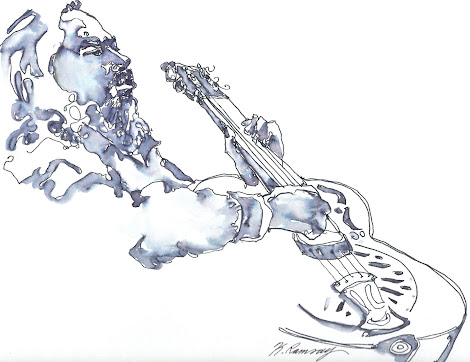 What is the sound of a single hand jamming? Some haters may loathe jam bands for the sin of meandering self-indulgence and mock their followers for too much stoner enthusiasm, but there's a lot of musical magic in the art of improvisation. The fans rightly appreciate those moments of the greater sum, where a kind of effortless communication guides the musical flow. Mike Gordon of Phish has talked about the exercises the band used in rehearsal to develop those skills and to prepare for shifting musical currents.
What is the sound of a single hand jamming? Some haters may loathe jam bands for the sin of meandering self-indulgence and mock their followers for too much stoner enthusiasm, but there's a lot of musical magic in the art of improvisation. The fans rightly appreciate those moments of the greater sum, where a kind of effortless communication guides the musical flow. Mike Gordon of Phish has talked about the exercises the band used in rehearsal to develop those skills and to prepare for shifting musical currents. Within the context of Phish, Trey Anastasio brought a lot to the band. As he followed a song's evolution, his signature guitar work could suggest players like Frank Zappa and Carlos Santana or slip into classic rock simplicity. He was an energetic front man, too, supplying lead vocals and much of the band's patter.
Unfortunately, Anastasio's latest album, Traveler suffers from phantom band syndrome. Like feeling the pain from a missing limb, these songs miss much of the tension and risk taking that his former bandmates brought to bear. It's telling that one of the best tracks is a cover of Gorillaz' Clint Eastwood.
Anastasio's version takes the cut beat groove of the original and uses his guitar to emphasize the reggae vibe suggested by the moody rhythm. While he lazily sings the chorus, Jennifer Hartswick kills on the verse vocals. She's expressive and her flow has a different vibe than the Gorillaz version; Hartswick is soulful and fluid where Del Tha Funky Homosapien delivers his lines with a bopping stutter beat.
Aside from the cover and a couple of more Phish-like tracks, Anastasio seems content to settle into a laid back, slacker vibe and his band rarely rouses him. He's dreamy and a bit detached. Jumping far back in his solo career, his album Trey Anastasio had a couple of tracks in this vein -- Flock of Words and Drifting -- but overall, he was more inspired then to mix up his rhythms and stretch out stylistically. On Traveler, songs like Let Me Lie and Architect are typical in taking a while to develop and never delivering much intensity.
To be fair, he and Phish always had a difficult time translating their stage energy to the studio context. Transitions that seemed natural in concert could seem contrived or heavy handed on record. Land of Nod breaks the pattern of lazy grooves to start with an interesting percussion exploration. This jumps into a snippet of melody that serves as the songs motif. Then the song segues through a series of vignettes, some of which return to the motif. Over the persistent syncopation, these changes vary from frantic to sparse, smooth to abrasive. There is an abrupt jump to a hypnotic interlude with the mantra, "I was asleep for so long." Ultimately, this is the kind of song that works better on stage, where the physical dynamics can augment the experience.
Scabbard and Traveler are the two classic Phish style tracks. Like Land of Nod, Scabbard sets up a series of short sections that run into one another, but this time the flow is smoother. Anastasio finally offers some more interesting guitar playing, laying down jazzy melodic lines twinned with the keys as well as some heavier lead work once the track locks into a steadier groove. It's good to hear his band open up more on this one, too.
Traveler has a moody funk groove. The drummer has some nice supporting fills that recall some of Jon Fishman's playing. The harmonies on the bridge fall into some of the old Phish patterns and we even get a taste of Anastasio's soaring guitar. And that's the strangest part of his phantom band syndrome: he seems to have lost interest in tearing up the fretboard.
It's natural for musicians to grow and move away from their roots. On its own merits, Traveler is not a bad album, but it's disappointing to hear Anastasio settle into a more comfortable, safer space.
(This review first appeared on SpectrumCulture)

No comments:
Post a Comment